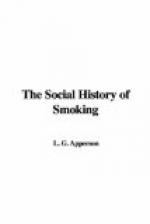In the afternoon the gallant might attend what Dekker calls a “Tobacco-ordinary,” by which may possibly have been meant a smoking-club, or, more probably, the gathering after dinner at one of the many ordinaries in the neighbourhood of St. Paul’s Cathedral of “tobacconists,” as smokers were then called, to discuss the merits of their respective pipes, and of the various kinds of tobacco—“whether your Cane or your Pudding be sweetest.”
Of course he often bragged, like Julio in Day’s “Law Trickes”: “Tobacco? the best in Europe, ’t cost me ten Crownes an ounce, by this vapour.”
An amusing example of the bragging “tobacconist” is pictured for us in Ben Jonson’s “Bobadil.” Bobadil may perhaps be somewhat of an exaggerated caricature, but it is probable that the dramatist in drawing him simply exaggerated the characteristic traits of many smokers of the day. This hero, drawing tobacco from his pocket, declares that it is all that is left of seven pounds which he had bought only “yesterday was seven-night.” A consumption of seven pounds of tobacco in eight days is a pretty “tall order”! Then he goes on to brag of its quality—your right Trinidado—and to assert that he had been in the Indies, where the herb grows, and where he himself and a dozen other gentlemen had for the space of one-and-twenty weeks known no other nutriment than the fume of tobacco. This again was tolerably “steep” even for this Falstaff-like braggart. He continues with more bombast in praise of the medicinal virtues of the herb—virtues which were then very firmly and widely believed in—and is replied to by Cob, the anti-tobacconist, who, with equal exaggeration on the other side, denounces tobacco, and declares that four people had died in one house from the use of it in the preceding week, and that one had “voided a bushel of soot”!
The properly accomplished gallant not only professed to be curiously learned in pipes and tobacco, but his knowledge of prices and their fluctuations, of the apothecaries’ and other shops where the herb was sold, and of the latest and most fashionable ways of inhaling and exhaling the smoke, was, like Mr. Weller’s knowledge of London, “extensive and peculiar.” It was knowledge of this kind that gained for a gallant reputation and respect by no means to be acquired by mere scholarship and learning.
The satirical Dekker might class “tobacconists” with “feather-makers, cobweb-lawne-weavers, perfumers, young country gentlemen and fools,” but he bears invaluable witness to the devotion of the fashionable men of the day to the “costlye and gentleman-like Smoak.”




